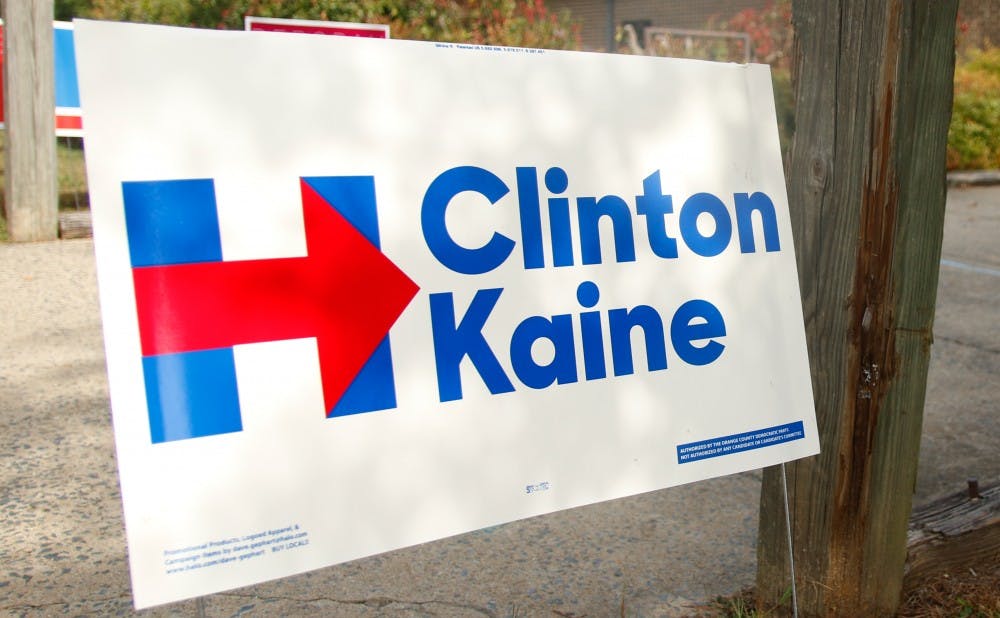Although most of Duke’s international students cannot vote in the U.S., they have nevertheless found themselves caught up in the political hype of this year's presidential election.
The Chronicle spoke with many international students to find out what they think about the election. Most indicated a preference for Clinton over Trump, while acknowledging that she has made mistakes in the past.
Junior Chelsea Liu, a Chinese-Canadian dual citizen, cited Clinton's vast experience in public policy.
“Hillary has spent more than three decades in public service, has consistently shown that she can get things done and cooperate with Republicans and Independents and has a platform that tries to be as inclusive as possible,” Liu said.
First-year Bigyan Regmi from Nepal said he feels that Clinton’s “experience in policy-making and politics” is instrumental for a national leader, as opposed to Trump who has no political experience, despite his business acumen. Sophomore Vidit Bhandarkar from India noted that he admires Trump’s business background but thinks that Clinton offers a more holistic platform.
Senior Thamina Stoll from Germany noted that despite Clinton’s past mistakes, she remains the most qualified U.S. presidential candidate. Stoll expressed admiration for Clinton’s stamina and tenacity, a characteristic that Trump himself acknowledged during the second presidential debate. Sophomore Amanda Sear—who is Canadian, but obtained her green card six months ago— echoed Stoll's sentiment, saying that Trump has no “knowledge, experience, or temperament to run this country”.
On Trump’s criticism of Obama’s open-door policy, Stoll said she believes some Americans feel that the Obama administration has not sufficiently protected their interests.
“I personally know families that have suffered from great economic disadvantages these past eight years, so I get why some people are more receptive to Trump’s ultra-conservative rhetoric,” Stoll said.
Only one international student interviewed expressed support for Trump. Jingkun Goh, a first-year from Malaysia, said he believes that Trump’s commercial shrewdness will be a strong asset to the U.S. in building an “economic powerhouse” and added that the general public is biased against Trump.
“I think that people are only focusing on the bad things about Trump. I believe that in reality, Trump is just trying to attract attention and stand out from the crowd,” Goh said.
A poll average by RealClearPolitics as of Oct. 30 shows that Clinton has a 3.2 point lead over Trump. However, a poll conducted by The Atlantic found that only 28 percent of women support Trump compared to 48 percent of men.
This trend is reflected in The Chronicle's interviews with international students as most of the women polled supported Clinton. Sophomore Sandra Batakana from Uganda said she regards Clinton as an embodiment of women's empowerment.
However, sophomore Emile Riachi, a Lebanese-French dual citizen and a Chronicle columnist, does not fully support either candidate. Although Riachi wrote a column in The Chronicle defending some of Trump's propositions on immigration, foreign policy, terrorism and trade, he said he disapproves of Trump’s divisive rhetoric. On the other hand, he expressed concerns over Clinton’s “interventionist” and “neo-conservative” foreign policy.
“Coming from Lebanon, a country in the Middle East, I fear that after pushing for the Iraq War, the intervention in Libya against Gaddafi and in Syria against Assad, she can destabilize the Middle East even more in the name of democracy and human rights, with specific economic and strategic interests underlying that rhetoric,” Riachi said.
Nevertheless, Riachi noted that several of his friends in Lebanon and Europe, mostly males, “are attracted by [Trump’s] rhetoric,” specifically his “charisma and lack of political correctness, as well as his showmanship skills and his ability to clash [with] his opponents on stage." His friends also “share some of [Trump’s] views on radical Islam and immigration." Riachi added that the Trump/Clinton divide—particularly regarding his closed-door policies and protectionist platform—transcends borders.
Most students said that there is a general disapproval of Trump’s divisive rhetoric back home, but shared that some of their family and friends support him. Liu said that most of her family in China says that Trump’s ideas resonate with them.
“I think xenophobia is even more prevalent in China than it is [in the U.S.] because there's so little diversity [in China],” said Liu.
When asked how U.S. elections differ from those back home, Stoll noted that the sensationalization of American politics, largely perpetuated by the media, is fascinating to her.
“In Germany, elections are much more policy-focused," she said. "German politicians hardly bash their opponents; instead they come up with very detailed campaign manifestos and those are being discussed in the public discourse rather than a nominee’s personal attributes.”
Junior Xinyu Li, a Chinese-New Zealand dual citizen, noted the length of U.S. presidential elections.
“In [China], elections are only really felt close to the actual voting date," Li said. "There’s also a much bigger push for voter registration [in the U.S.] than back home."
Sophomore Joseph Tan from Singapore said that he wants a U.S. president who will prioritize America's international responsibilities and interests.
"Regardless of who becomes president, I hope that U.S.-Asia relationships continue to remain steadfast," Tan said. "Existing relationships between American and Asian civil servants will be even more critical in navigating through this period of political uncertainty.”
Get The Chronicle straight to your inbox
Signup for our weekly newsletter. Cancel at any time.

